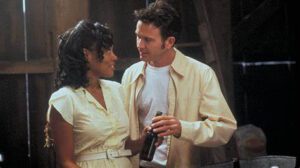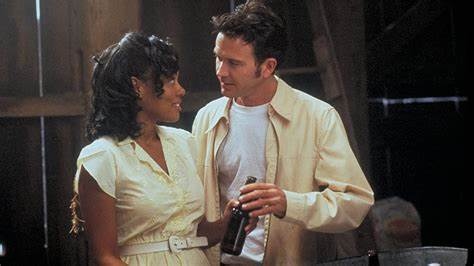Movie Info
Movie Notes
A Comparison Review
Movie Info
- Director
- Richard Friedenberg
- Run Time
- 1 hour and 45 minutes
- Rating
- PG-13
VP Content Ratings
- Violence
- 2/10
- Language
- 1/10
- Sex & Nudity
- 2/10
- Star Rating
Relevant Quotes
Let him kiss me with the kisses of his mouth!
For your love is better than wine…
I am black and beautiful,
daughters of Jerusalem,
like the tents of Kedar,
like the curtains of Solomon.
From one human being he created all races of people and made them live throughout the whole earth.
Don’t let the world around you squeeze you into its own mould, but let God re-mould your minds from within, so that you may prove in practice that the plan of God for you is good, meets all his demands and moves towards the goal of true maturity.

The story of the Virginia inter-racial couple whose arrests led to a historic Supreme Court case is well told in this 1996 Showtime film directed and written by Richard Friedenberg (scriptwriter of A River Runs Through It). I have only just discovered it while preparing to lead a discussion of the 2016 film Loving. The two films tell the same story, but the details they include often are very different, even conflicting. I would say the more recent film emphasizes the legal aspect of the Loving’s relationship, whereas the cable version reveals the clashes between the couple during their exile in Washington D.C. that threatened but did not destroy the deep love of this ordinary couple caught up in an extraordinary cause.
Richard Loving, played by veteran actor Timothy Hutton and Mildred “Bean” Jeter (Lela Rochon) were raised in Central Point, Va., a very small village where blacks and whites have lived side by side in harmony. Richard races cars in partnership with Leonard (Bill Nunn), and there are no objections when the white driver starts dating the latter’s sister—although Richard’s mother is not overjoyed by this. When Bean (shortened nickname for “String bean”) becomes pregnant, Richard announces that he wants to marry her, despite Leonard’s reminding him that it is against the law. Both sets of parents are upset, the Jeters saying that such things are not done. “It’s he right thing to do,” Richard asserts, not believing that anyone would care enough to enforce the odious law in their remote community.
Wrong! Somebody does inform the sheriff, and so on the night of the couple’s wedding reception (the celebration is interracial) the cops break into their house while they are in bed asleep and arrest them. Judge Bazile shares the racial bigotry underlying the Jim Crow miscegenation law, and gives the couple the same lecture heard in the 2016 version, that God has created the different races and set them apart on different continents so that they would not mix. (The writers of both films use court records—both for the local, and later, the Supreme Court hearings.) Judge Bazile sentences them to a year in prison but says he will suspend the sentence if they agree to leave the state and not return together for 25 years. The Lovings agree, and move up to D.C.
The two films diverge considerably in details: for their first trip to D.C. to get married the couple travel alone, not with her father as a witness as in the 2016 film; the couple are turned away by several white landlords before being able to rent an apartment in a rundown section of D.C., rather than moving into what seems to be either a friend or a relative’s large home in the later version. Mildred, sitting on the front steps, is welcomed with a platter of chicken by neighbors Sophia (played by the great Ruby Dee). Also there is a man nicknamed Blue (Isaiah Washington), an active SCLC member, and two female hairdressers. When Richard comes home he brushes past them. Inside, Bean is a bit upset—he had left her scrubbing floors to go back home to race his car—but his good news lifts her spirit. A man down there from Washington has offered him a job, and on the basis of this Richard has bought them a used TV set.
On the night Mildred is ready to give birth a white hospital refuses to admit her, with Richard so upset that the security guard forces him to leave. They finally find one that will accept them, an all” Negro” hospital, and their son is born. You can imagine the stares from the nurses and the mothers when Richard walks into the ward to see his son. However, in the 2016 film the couple sneak back to Virginia so that Richard’s midwife mother can deliver the baby.
Jump to 1963 when Mildred is getting to go with her neighbors to hear Dr. King speak during the March on Washington. (Right after the birth of their son she had telephoned Mama Jeter and mentioned that her friends had “gotten me into Civil Rights”—and when her mother had been upset, assured her she wasn’t arching.) Mildred and all are dressed up in their Sunday best, with even the infant sporting a red bow tie. Richard, however, refuses to go. This so upsets Mildred that she tells her friends to take their infant because she wants him to see Dr. King. Turning on their TV, she watches Dr. King delivering his impassioned speech. The camera cuts back and forth between her rapt face and Dr. King and the crowd in front of the Lincoln Memorial, so that we hear virtually all of the famous portion. Richard enters and also watches. Jump to Mildred holding their little son while handing him her mail to drop into the mailbox. We see that one of the envelopes is addressed to A.G. Robert Kennedy—thus this film makes clear that it is Dr. King’s speech, and not a friend’s suggestion, that inspires Mildred to reach out for help. Indeed, we do not hear or see Dr. King in the 2016 film, just brief clips of the crowds gather on the Mall.
Other ways in which this film is different includes Richard blaming the March for his losing his job; his selling his race car for the money, followed by his returning to D.C. and seeing as he drove up to their house his wife with Blue and Sophia on their front steps, punching out the Black man because he had been caressing Mildred’s hair, the result being that the couple get into quite a heated argument, each making accusations against the other. Richard starts to walk out but is brought back by Mildred’s informing him she is pregnant again. They cuddle and talk about the hate stares when they are out on the street. As in the second film, they do decide to move back to Virginia where they find an isolated house, but are again arrested by the sheriff—but they break away from him and a car chase ensues, the couple managing to escape back to D.C.
The second film is better in showing that there was more than just one lawyer Bernie Cohen (Corey Parker) involved in the case. There are meetings between lawyers to work out strategy and with the Lovings to explain matters to them. Mr. & Mrs. Loving truncates considerably the above events, showing the passing of three years by means of a montage of the Lovings adding two more children to their family interspersed with shots of Cohen working on the case—all these accompanied by the Byrds singing Pete Seeger’s great song, “Turn, Turn, Turn.” I love too, following Cohen’s speech before Supreme Court, the use of the song on Branford Marsalis soundtrack by Curtis Mayfield “People Get Ready.”
Director/writer Richard Friedenberg shows us more of the Jeter family: https://www.imdb.com/name/nm0724592/?ref_=tt_cl_t_9Jackie Richardson is a delight as Mama Jeter, at first worried and well aware of the dangers of her daughter marrying a white man, but welcoming him when they go ahead with their marriage anyway, and always ready to offer support, such as insisting that because she has more room, they should move in with them when the Lovings return to Virginia.
Both films do well by focusing upon the Lovings as a couple wanting to lead an ordinary life without the world interfering, rather than going into the details of the courtroom battle. While conflicting in many details, they both honor that case with its nationwide ramifications. The 1967 Supreme Court decision in the Lovings’ favor knocked down the hateful miscegenation laws still on the books in 17 states, and that by declaring that marriage to be a Constitutional right was influential in the battle for the legalization of gay marriage later on.
If I had to choose between the two, I would pick the Showcase version. The second has some incidents which I wish could have been in the first. Fortunately, no one has to choose, but can watch and enjoy both.
This version is available on several streaming services for rental, but free on YouTube. (The latter has 3 or 4 ads, but you can skip them after 4 or 5 seconds.)
This review will be in the March issue of VP along with a set of questions for reflection and/or discussion. If you have found reviews on this site helpful, please consider purchasing a subscription or individual issue in The Store.

